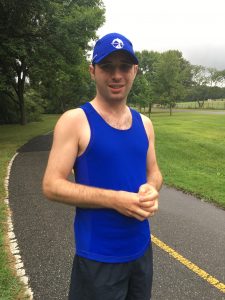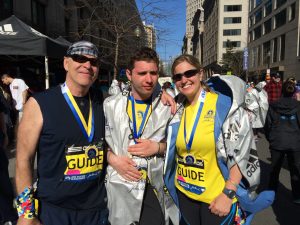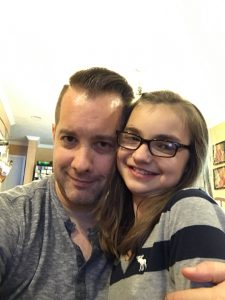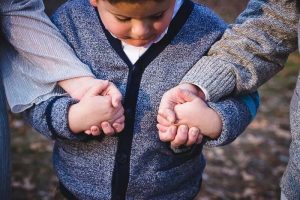Prologue by Autism Daddy: Howdy folks! Long time no blog! I hope y’all are well! I wanted to come out of blogging retirement to share a guest blog post written by my good friend Allan Schneider. Allan and his...
Prologue by Autism Daddy:
Howdy folks! Long time no blog! I hope y’all are well! I wanted to come out of blogging retirement to share a guest blog post written by my good friend Allan Schneider. Allan and his wife Robyn have been an inspiration to me and the entire autism community and running community. They have two twin severely autistic sons, Jamie & Alex, who they have guided thru many full 26.2 mile marathons!
In 2013 Allan was about halfway thru the Boston Marathon with his son Jamie when the bomb went off.
This is his story…
The Finish Line
By Allan Schneider, as told to Cheri Johnson
The first sign of trouble was a roar of engines behind us. Over my shoulder, I saw flashing lights. Police motorcycles were threading through the pack of runners as people jumped to either side of the street to get out of the way.
Quickly I turned to gauge the look on my son Jamie’s face. Had the loud noise spooked him? That was when I saw that in front of us, everyone was slowing down.
As the father of twin sons with severe, nonverbal autism, I’ve had many long and difficult days. I’ve gone to bed dead tired but unable to sleep, wondering if I did the wrong thing in response to one of my son’s behaviors. Should I have been more strict? Or was I too sharp—did I let my temper get the best of me? I’ve lain awake wondering what the consequences will be.
But no day before or since has matched the challenges I faced as a parent on April 15, 2013. Jamie and I were five miles away from finishing our second Boston Marathon. Jamie’s former therapist Katie was running with us, too—until we were all boxed in by two walls of police officers.
I checked the time. At this point in the race, Jamie’s brother Alex, a gifted, speedy runner, would be with his running guides Kevin and Stephen celebrating at the finish line. There, my wife Robyn, Stephen’s wife Danielle, and their two children had been waiting to cheer them on.
The level of chatter in the crowd of runners began to rise. Had there been an accident? When could we start running again?
Jamie’s soft face still held its usual innocent, placid expression. Then a siren blast made him jump.
Katie put her hand on his arm. Protective and attentive, she is as attuned to his moods as I am, to the signs of unease that can indicate he is on the verge of a meltdown: flailing his arms, stomping his feet, vocalizing incoherently. It was nerve-wracking to think of an episode like that happening now, when everyone around us was on edge and we were surrounded by armed cops. Jamie is just shy of six feet tall, and in 2013 he was twenty-two years old. A toddler having a tantrum isn’t threatening; a grown man is a different story.
“OK, Jamie?” Katie said.
Was he okay? Jamie’s bright blue eyes were growing big. He knew this was not the way a race was supposed to go. And lately, running—and life in general—had become more difficult for him. When he and his brother had first started racing at the age of fifteen, Jamie, always the happier and more easygoing of the two, had loved race days. He loved meandering peaceably through a course. Sharing high fives with other runners and onlookers, basking in the smiles and the celebration, laughing and rocking out to the music. In this way, he was like me; I like the social aspect of racing, too. I can’t have a conversation with my son about this, or about anything else. But I feel close to him when we run together: like we’re sharing our thoughts and feelings through our mutual experience of the race.
In 2012, however, Jamie had been diagnosed with catatonia, a condition that develops in about 15% of adolescents on the autism spectrum.[1] He became more fearful and more sensitive to heightened emotions in people’s voices. In a race, I now had to keep him squarely in the middle of the road, away from the cheering crowds that used to fill him with delight.
Jamie also began to do everything, from eating to tying his shoes, at a glacial pace. Sometimes he froze mid-step in a doorway. If we tried to hurry him, he often got upset or even had a tantrum.

Over the past year, medicine and therapy had helped Jamie to the point that we felt we could try Boston again. He had had such a good time in the 2011 marathon. Running had transformed both of our sons’ lives. They liked other activities, too: horseback riding, swimming, basketball, piano lessons. But none of these gave either of them the kind of joy we saw on their faces at a big race. Robyn and I had decided that it was best to—gently, letting him set the pace—push Jamie through. As parents, we’d done this delicate dance of balancing risk and reward thousands of times since Jamie and Alie (our nickname for Alex) were diagnosed at 21 months old. We continue to do it every day.
Now, disaster had struck. Keeping both Jamie and Katie close—the last thing we needed was to get separated in case the police started dividing up the crowd—I made my way to an officer. He told me there had been an incident at the finish line.
I thought of Robyn and Alie. Kevin, Stephen, Danielle. Their children. Katie’s mother and father, who had driven all the way from Virginia to see us finish. When I spoke, I had to work hard to keep the fear out of my voice, for Jamie’s sake. “Is anyone hurt?”
“There have been numerous injuries,” the officer said.
No matter how many times I tried, I couldn’t get a call or text through to Robyn. Katie had no luck, either. The networks were already overloaded.
A few messages must have already gotten through, however. Rumors were beginning to ripple through the crowd about an explosion. Maybe more than one.
I put my arm around Jamie, whose teeth were chattering. We were dressed for running 26 miles in the day’s ideal race temperatures—40s and 50s—not for standing still in the street. Our arms and legs were bare. And Jamie was obviously confused, though still fairly calm, still shielded from much of the crowd noise by the music on his iPod. I wondered how long this was going to go on and how long the charge on that iPod would last.
After forty minutes, an officer announced we were going to a nearby church. On top of the fear we were all feeling, I felt a wave of disbelief wash over the crowd. Then crushing disappointment. After all the training and sacrifices, and after twenty-one miles, we wouldn’t get to finish our monumental achievement. The race was over.
We trudged to the church. Its flight of stone steps seemed endless. Inside, we collapsed into the pews. Everyone who had a cell phone was trying to text and call. Rumors were spreading, many of which turned out to be false: there had been an explosion at the JFK Library; an eight-year-old girl running the race for Sandy Hook victims had died.[2] Other stories, of course, were true: two bombs had gone off seconds apart on Boylston Street.
After a long hour, Katie reached her parents. They were uninjured but traumatized. They asked where we were and said they were coming to the church to meet us.
I was relieved for Katie. But the images I was hearing about—billowing smoke, people bleeding and screaming, their clothes in tatters—had only heightened my fears about Robyn, Alie, and the others. At the front of the church, officers had begun announcing names. If your name was called, you were told to come forward so that a cruiser could take you to the finish line. Quickly we all figured out what that meant: someone you loved had been hurt. Every time someone’s name was called, a cry rang out.
I watched Jamie, tousled his sweaty brown hair, checked to make sure his music was still on. I listened for my name while I kept at my phone. Calling. Texting. Calling again. My fingers were still cold and fumbling.
Finally, a text came through. They were fine. They were all fine. I was so relieved my hands shook.
Now, now—Katie and I just had to get Jamie through this, back to the hotel where everyone was waiting . . .
Katie’s parents arrived and we went outside to meet them. As soon as I saw their stricken faces, I got a hollow feeling in my stomach. I knew even before they said it that they wanted to get out of town right away, and they wanted to take Katie with them. The bombers hadn’t been caught. Who knew what might still be coming?
I could tell Katie was rattled. She wanted out of Boston, too. But she felt terrible about leaving me alone.
“I can’t. I won’t,” she said.

I almost took her up on it; I almost begged her to stay. But I couldn’t. Getting their daughter out of harm’s way was her parents’ job, just as protecting Jamie was mine.
“Go,” I said. “Please. We’ll be fine.”
Before they left, Katie’s father insisted on going to an ATM and pressing $500 into my hands. I had no wallet, no keys, no identification except the tags on mine and Jamie’s shoes.
Then they were gone. Heading back into the church with Jamie, surrounded by people, I felt completely alone. I had lost my co-captain. I could no longer leave Jamie with Katie if I needed to speak to someone in charge or even go get a drink of water.
And what if I got sick or fainted? I have multiple sclerosis, and if I don’t sleep for an hour or two in the late afternoon, I get groggy and confused.
There was so much at stake. Jamie’s catatonia had been triggered by a traumatic event at school. Would all the progress he had made since then be erased today? When Jamie’s meltdowns really spiral, he hits and bites himself. Any parent who has ever had to witness their child engage in an act of self-destruction while in the throes of frustration or despair knows the helpless, bottomless agony I was facing.
We had spent hours with our clinical team designing behavioral strategies to calm Jamie. Now, it was up to me to remember everything and get it right.
Next to me in the pew, Jamie was quiet and he looked worn out. At the same time, he no longer seemed to be floating in his own tranquil world. He was turning his gaze, wide-eyed, around the church, taking in all the distress around him.
Should I try to distract him with a snack or a drink? Or maybe try to get him to sleep? We had been up since before dawn. Normally we would have finished the race by now and been resting in the hotel. It was past five, and Jamie wasn’t the only one who was tired.
I struggled to focus. I felt a headache coming on. “Hey, Jamie,” I said.
I kept talking to him. I massaged his shoulders to remind him that I was here, he was safe, I wasn’t going to let anything happen to him.
His muscles were rigid. But after a while, he sighed. Finally, I got him to relax enough that he lay down in my lap. I watched his fingers unclench, felt his shoulders drop.
For a moment, I relaxed a little, too. Around us, runners wrapped in blankets were trading worries and reassurances. I wanted to join in. I love striking up conversations with strangers. I wanted to talk about the sadness we were all feeling. About the lives lost or altered forever, the loss of trust and innocence in the racing community.
But for now, I stayed quiet. As Jamie was dozing off, the charge on his iPod went dead. Katie was already gone. When Jamie woke up, the anodyne harmonies of the Beach Boys would be, too.
A short time later, Jamie woke up yawning. He seemed a little better. Then the night was just one tedious minute after another. One hour plodding into the next. Its own kind of marathon, with an unknown finish line.
Around 7:30, a bus took us back to Boston Common. Usually, downtown Boston on marathon night is one big street party. Tonight, it was a ghost town. Only officers patrolled the streets. There were police snipers on rooftops. Barricades everywhere. Searchlights sweeping every corner of the city looking for the bombers, looking for more bombs.
The bus stopped a couple miles from our hotel and we got out into the chilly evening. Because of my MS, I’m not great with directions under the best of circumstances. Tonight, my head was pounding. Weary and disoriented, I blundered around with Jamie in the dark.
He gripped my hand. Followed me wherever I led him. Just when I was certain we were almost to the hotel, we would get blocked by another barricade or told by an officer with a machine gun, or a German shepherd, or both, that we had to turn around. Officers asked Jamie questions: who was he and what was he doing here? They got suspicious when he didn’t answer. When I jumped in to speak for him, they looked at me suspiciously, too.
Finally, we made it. Our hotel had been turned into the official command center. The place was swarming with news crews and the mayor was giving press conferences on the steps under glaring white lights.
I got Jamie away from the mayhem and into our room. Robyn reached for him as I reached for Alie. We all held onto one another for a long time.
“We were right there!” Robyn cried.
She and Danielle and the children had been sitting in the front row of the grandstands directly across the street from where the bombs were planted. If Alie hadn’t beaten his time from his last Boston Marathon, they would have been there, and not already back at the hotel changing Alie’s clothes, when the bombs went off. Just as they were heading back to watch Jamie and I finish, they heard the explosions.
Jamie still looked stunned, though Alie was fairly serene. He had, as usual, come beaming across the finish line. For him, it had been almost a normal race day.
I hugged both of my sons again. Then, while Robyn took them into our room to wind down, I went with Kevin and Stephen to the hotel pool. I was so grateful they were there, these men who have done so much for our family. Like Danielle and Katie, who worked for years with the boys as home therapists, they have loved and protected Jamie and Alie as if they were their own.
I jumped into the deep end with my clammy race clothes still on. Under the water, everything was delectably dark and quiet. Over and over, after coming up for air, I sank back down to the bottom and rested there.
The next day, as we drove out of town, Jamie would crave the same kind of decompression and silence. Robyn and I could barely say a word without upsetting him. And for months afterwards, he would have trouble sleeping. He’d get anxious in crowded places. It would be a long time before he enjoyed races again.
But that night, I didn’t know any of that yet. And as the day began to dissolve in the balmy water, I began to think about it with a sense of wonder and pride. How in the world had I gotten Jamie through that?
But I had done it. I had kept my son safe. It had been the longest day I’d ever experienced as a father. But it is also the day I’m most proud of.
In the hotel pool, I came up for air. But it wasn’t time to return to the real world. Not quite yet. Up here on the surface—for the moment, anyway—everything was taken care of. I dove back under again.
[1] https://www.ncbi.nlm.nih.gov/pmc/articles/PMC7519964/
[2] https://www.washington.edu/news/2014/03/17/hold-that-rt-much-misinformation-tweeted-after-2013-boston-marathon-bombing/
ABOUT THE AUTHORS
Cheri Johnson’s fiction, poetry, reviews, and literary biographies have appeared in such publications as Glimmer Train Stories, Pleiades, Puerto Del Sol, New South, The Rio Grande Review, Provincetown Arts, and the American Writers Supplement. Her chapbook of poems, Fun & Games, was published in 2009 by Finishing Line Press, and she has written two series of nonfiction books for young readers (Origins: Urban Legends and Origins: Whodunnit) for Full Tilt Press. She studied writing at Augsburg College, Hollins University, and The University of Minnesota, and she has won grants and residencies from Yaddo, The McKnight Foundation, The Bush Foundation, the Fine Arts Work Center in Provincetown, the Minnesota State Arts Board, the Metropolitan Regional Arts Council, and the Knight Foundation. She has taught creative writing at the University of Minnesota, the Loft Literary Center, and in the MFA program at Augsburg College. Her collaborations include work with composer/playwright Aaron Gabriel, composer/performer Julie Johnson, and the Zeitgeist New Music Ensemble in St. Paul.
Allan Schneider is a contributor of Silent Running-Our Family’s Journey to the Finish Line with Autism, written by his wife, Robyn K. Schneider. He is an active member of various autism organizations and promotes autism awareness in many media outlets. He is a proponent of healthy lifestyles through nutrition and exercise while combating the effects of Multiple Sclerosis.
Robyn K. Schneider is the author of Silent Running-Our Family’s Journey to the Finish Line with Autism. Robyn advocates for improving the outcomes for children and adults on the autism spectrum as well as promoting the benefits of exercise for individuals with autism and other medical conditions. She has written articles and blogs on topics related to autism, and she and her family have been featured in numerous major media outlets worldwide, including The New York Times, The Boston Globe, Runners World, Good Morning America, and World News Tonight.
The post The Finish Line: My Most Difficult Day as An Autism Dad — A Guest Post by Allan Schneider appeared first on The Autism Daddy.










